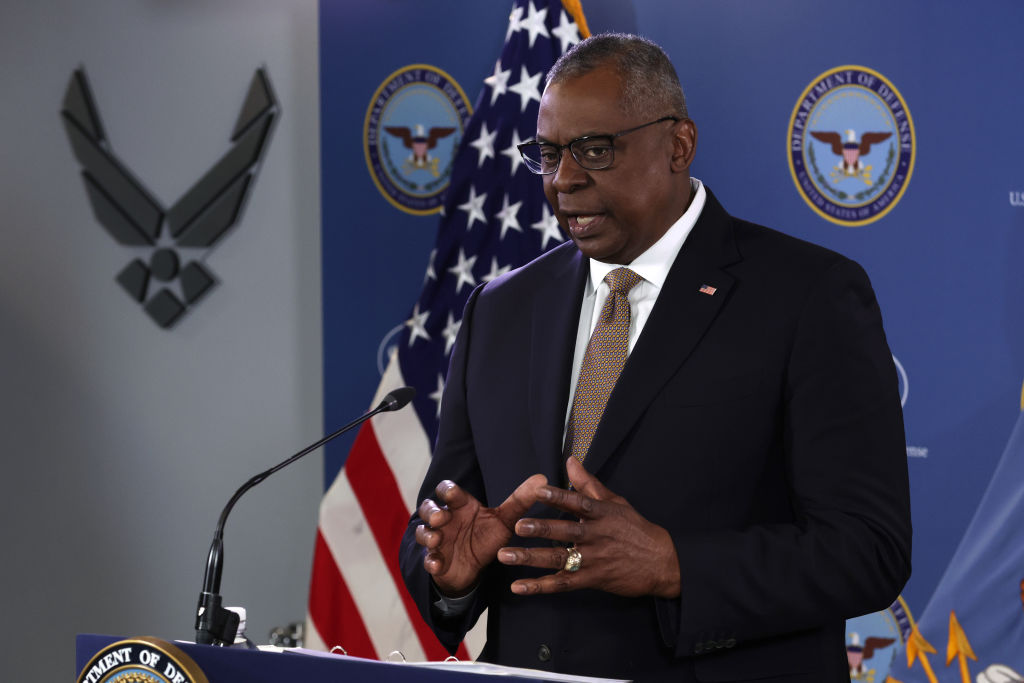U.S. Intelligence Leaks Threaten to Damage Alliances
Happy Wednesday! Between an “uncooperative” squirrel getting its head stuck in a manhole cover in Germany and nutria “of unusual size with orange teeth” wreaking havoc across the United States, yesterday was a really big day for rodent news, if you’re into that kind of thing.
Quick Hits: Today’s Top Stories
- The Biden administration has reportedly begun giving the “Gang of Eight”—a bipartisan, bicameral group of congressional leaders privy to highly classified briefings—access to copies of classified documents improperly retained by former President Donald Trump, former Vice President Mike Pence, and President Joe Biden. The Department of Justice had previously denied House and Senate Intelligence Committee requests to view the documents, arguing the move would compromise investigations of the documents’ mishandling.
- Manhattan District Attorney Alvin Bragg filed a lawsuit Tuesday against GOP Rep. Jim Jordan, chair of the House Judiciary Committee, after the committee announced an investigation into Bragg last week. Bragg’s suit seeks to prevent aspects of the congressional inquiry from moving forward—including the subpoena of Mark Pomerantz, a former assistant attorney in Bragg’s office.
- Protesters in Ethiopia’s Amhara region blocked major roads yesterday as part of a days-long protest against a plan to dissolve regional military forces into the national army and police. The Amhara Special Forces gained power during Ethiopia’s recently ended civil war after joining the central government’s fight against the Tigray region. Two Catholic Relief Services workers were killed while traveling through the region during the ongoing protests, and other people have reportedly been injured amid the unrest.
- The Israeli Defense Forces on Tuesday conducted a raid in the West Bank city of Jenin, detaining five Palestinians allegedly planning a terror attack. The Palestinian Islamic Jihad claimed it attacked the Israeli forces involved—firing on soldiers and detonating explosive devices—though no Israeli soldiers were injured. The operation follows several recent terror attacks in Tel Aviv and the West Bank and Israel’s retaliatory airstrikes on Hamas targets in Gaza and Lebanon.
- Tennessee Gov. Bill Lee, a Republican, signed an executive order Tuesday requiring more timely updates on criminal activity and mental health in the state’s background check system. Lee also called on the state’s legislature to pass a red flag law—a measure allowing law enforcement to seek court orders to confiscate firearms from individuals deemed a danger to themselves or others. The announcements come two weeks after a shooter killed six people—including a friend of Lee’s—at a Christian school in Nashville.
- The Democratic National Committee announced yesterday the party’s 2024 convention will be held at the United Center in Chicago next August. Illinois Gov. J.B. Pritzker pledged fundraising efforts to cover the costs if the convention—the first one held in-person since the start of the pandemic—came to the Windy City. The Republican National Convention will be held in Milwaukee in July.
- Jersey City Mayor Steven Fulop announced yesterday he will seek the Democratic nomination in New Jersey’s 2025 race to succeed term-limited Democratic Gov. Phil Murphy. Fulop is the first Democrat to enter the race and, in anticipation of the bid, already announced in January he would not seek another term as mayor.
- South Carolina Republican Sen. Tim Scott announced Wednesday morning that he is forming an exploratory committee as he considers a campaign for president. In a just-released video framing the announcement, Scott invokes April 12, 1861, the day “the first shots of the Civil War were fired,” and warns that the country faces a similar test today. “Once again, our divisions run deep and the threat to our future is real.” According to the Charleston Post and Courier, Scott will appear in Iowa today and New Hampshire tomorrow as he begins his public look at a bid for the White House.
The Pentagon’s Sprung a Leak

In the months leading up to Russia’s invasion of Ukraine in February 2022, the U.S. government embarked on a widely-lauded intelligence-sharing operation to warn the world Vladimir Putin was on the move and preparing to attack his neighbor. A little more than a year later, intelligence-sharing of a decidedly less strategic variety has the U.S. and its allies on the defensive.
In early March, dozens of classified documents, seemingly originating at the Pentagon, surfaced on social media websites including Twitter, 4chan, Telegram, and Discord—an online chat platform used primarily by video gamers. Several of the documents have “Top Secret” markings, the nation’s highest security designation, and they largely—but not exclusively—concern intelligence on the war in Ukraine: about the Russian government, Ukrainian officials and their upcoming spring offensive, and the actions of allies and foes relative to the war.

Judging the Judges
For a job with a single, centrally located office, being a Supreme Court justice sure involves a lot of travel.
The taxpayer won’t pick up the tab—but justices don’t always, either. The late Justice Antonin Scalia, for instance, took more than 250 subsidized trips in his last decade on the court, both for vacations and for events tangentially related to his job like speeches. Former Justice Stephen Breyer, according to his public disclosures, also took 185 trips that were at least partially funded by someone else between 2012 and 2022, when he retired.
Just this past January, Justice Elena Kagan visited San Diego to dedicate a Navy ship built by General Dynamics, a company which has had business before the court and which recently won a $298 million contract to update the judiciary’s computer systems.
Maybe Kagan paid for that trip herself—we likely won’t know until at least 2024, when her annual disclosure is released. But as demonstrated by recent revelations about Justice Clarence Thomas’ failure to report paid-for travel, rules about the justices’ required disclosures have left plenty of loopholes. Some judicial scholars argue the high court’s lack of a formal code of ethics or an external means of enforcement has corroded trust in the justices’ independence. But in a closely divided Congress, calls from Democratic lawmakers—frustrated with the court’s direction—for the body to adopt a code of ethics will likely go nowhere.
As we noted last week: ProPublica reported Thomas has accepted hundreds of thousands of dollars worth of luxury trips—private jet flights, yacht voyages, stays at private retreats—over several decades from longtime Republican donor and real estate magnate Harlan Crow. (As we also noted last week: Harlan Crow is a minority investor in The Dispatch and a friend of the founders.) By the letter of the law, Thomas could argue—and has—that his failure to include Crow’s largesse in his financial disclosures could be explained by a personal hospitality exemption in existing disclosure requirements. But as of last month, that loophole has been closed: The Judicial Conference setting policy for federal courts clarified that free trips and air travel require disclosure, and Thomas has said he will abide by the changes.
Crow has said he extended the invitations as a friend and never attempted to influence Thomas’ jurisprudence, while Thomas has defended his lack of disclosures. “Early in my tenure at the court, I sought guidance from my colleagues and others in the judiciary, and was advised that this sort of personal hospitality from close personal friends, who did not have business before the court, was not reportable,” he said in a statement. “I have endeavored to follow that counsel throughout my tenure, and have always sought to comply with the disclosure guidelines.” This isn’t the first time Thomas has struggled with disclosures, however—the justice explained a six-year failure to report his wife Ginni Thomas’ employment by saying it was “inadvertently omitted due to a misunderstanding of the filing instructions.” And after his acceptance of tens of thousands of dollars worth of gifts attracted some negative press in 2004, he began disclosing far fewer gifts.
Though judges on lower courts must abide by a code of conduct, the Supreme Court has maintained its potential immunity to any such external standards. In 2011—after Congress directed justices to follow disclosure rules—Chief Justice John Roberts tartly noted, “The court has never addressed whether Congress may impose those requirements on the Supreme Court.” The justices voluntarily consult and comply with federal judges’ ethics code, he said, but binding themselves to that standard would be inappropriate because it does not “adequately answer” unique ethical challenges the high court faces.
That reasoning hasn’t convinced everyone. “These are smart people,” said Steven Lubet, an emeritus professor at Northwestern Pritzker School of Law who studies judicial ethics. “They can figure out how to write code that addresses the unique problems of the Supreme Court.” But Lubet noted recusal policies are more complicated at the Supreme Court, because, unlike in lower courts, there aren’t any backup judges who can fill in on a case, potentially leading to problems—like a 4-4 decision.
In the wake of the Thomas story, Democratic lawmakers have renewed longstanding calls for the court to adopt a code of conduct. Democratic Sen. Sheldon Whitehouse of Rhode Island—who leads a Senate subcommittee overseeing federal courts—has reintroduced legislation demanding the court adopt and publish its own ethics code, including clear disclosure and recusal policies. “It’s no wonder that the American people are losing faith in the idea that they can get a fair shake before the nation’s highest court,” Whitehouse said. Democratic Rep. Alexandria Ocasio-Cortez has called for Thomas’ impeachment.
It’s unlikely either measure will advance past Republican opposition—and some GOP lawmakers have questioned Democrats’ motives in calling for reform. “There’s one place of power that the Democrats don’t control, and they can’t stand it,” GOP Rep. Jim Jordan argued last year. “They can’t stand the fact that they don’t control the United States Supreme Court.” And after the ProPublica report was published last week, Republican Rep. Darrell Issa of California— Whitehouse’s subcommittee counterpart in the House—defended Thomas’ honor. “The American left has waged a 30 years’ war on Clarence Thomas and his family,” he said. “All the while his character, integrity, and sense of humor have remained steadfast, resolute, and intact.”
Still, various scandals—as well as efforts to delegitimize the judiciary—seem to have made a major dent in public perception of the court. Gallup reported last year that just 25 percent of Americans said they had “a great deal” or “quite a lot” of confidence in the Supreme Court, an all-time low and down from 36 percent in 2021.
Democrats argue stricter ethics requirements could restore some trust—but even if they could muster up enough support to pass Whitehouse’s proposed legislation, it’s not clear how it would be enforced. Democratic Sen. Chris Van Hollen of Maryland—who leads an appropriations subcommittee responsible for writing the judiciary’s annual funding package—has supported the idea of withholding the court’s funding unless it complies, but even judicial ethicists who want a code of ethics question the wisdom of using such a blunt instrument. “The public depends on a well-functioning court system—it’s like playing chicken with the availability of justice,” Lubet told The Dispatch, also criticizing calls for Thomas’ impeachment over the disclosure dustup. “Failure to disclose is a bad thing, but not every bad thing is impeachable.”
Still, Lubet argued the court should create and publish a code of ethics, whether or not it’s legally enforceable. “Then public opinion—which is actually the only corrective for the Supreme Court—would be able to respond to activities of the justices that either did or didn’t fall short of the ideal,” he said. “What are they afraid of?”
Worth Your Time
- In The Atlantic, Jonathan Rosen tells the story of a childhood friend struggling with schizophrenia but failed by the system to tragic results. “And so it was that my best friend from childhood, who had grown up on the same street as me; gone to the same sleepaway camp, the same schools, the same college; competed for the same prizes and dreamed the same dream of becoming a writer, was arrested for murdering the person he loved most in the world,” Rosen writes. “Asylum was also what Michael needed in the months before he killed Carrie. Not ‘an asylum’ in the defunct manner of the vast compounds whose ruins still dot the American landscape like collapsing Scottish castles, but a respite from tormenting delusions—that his fiancée was an alien, that his medication was poison. Because he was very sick but did not always know it, Michael had refused the psychiatric care that his family and friends desperately wanted for him but could not require him to get.”
- Matthew Yglesias has a message for Chicago’s recently elected mayor, Brandon Johnson: success will require standing up to public-sector unions. “Both police officers and teachers are held in high esteem by most people who (with some reason) regard these professions as more honorable and service-oriented than, say, politics or journalism,” he writes in Bloomberg. “This gives the unions that represent them a level of political clout over and above their formal bargaining power. Almost by definition, however, what’s best for public-sector workers—especially long-tenured or even retired public-sector workers, who have the most influence in union politics—is not necessarily what’s best for the public.”
Presented Without Comment
Also Presented Without Comment

Toeing the Company Line
- Who is the newest addition to The Dispatch? What else did Drucker see in Tallahassee? Why do young conservatives wear such long ties? Steve was joined by Drucker, Jonah, and Mike Warren, to discuss all that and more on last night’s Dispatch Live (🔒). Members who missed the conversation can catch a rerun—either video or audio-only—by clicking here.
- In the newsletters: Sarah breaks down (🔒) the problems with lawmakers calling on the Biden administration to ignore federal court rulings, Nick weighs (🔒) Ron DeSantis’ electability, and Haley considers the implications of the Pentagon leaks.
- On the podcasts: Jonah and Sarah discuss the famous Nazis-marching-in-Skokie case.
- On the site: Jonah argues that Russia’s war crimes in Ukraine are part of a long tradition and Kevin unpacks the difference between regulation and oversight.
Let Us Know
What should the Biden administration be doing right now to contain the fallout of the Pentagon leaks? How much damage do you think they’ll do to the United States’ relationships with its allies?